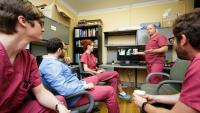Clinical Research & Education Research

Cardiac
Current studies focus on patients undergoing elective open heart and ventricular assist device (VAD) insertion surgeries, and evaluating the relationships between transesophageal echocardiographic (TEE) parameters of ventricular function and catheter-derived pressure measurements.
Research Faculty
Clinical Neurosciences
Research in Clinical Neurosciences allows our anesthesiologists to use the latest brain monitoring technologies to inform their administration of anesthetics during surgery. By using an EEG (electroencephalogram), we are able to carefully consider the drugs administered during surgery by observing the patient’s neurophysiology. Through the use of EEG and other technologies, we hope to minimize post-operative delirium by improving the recovery from anesthetics.
Research Faculty
Education
The field of anesthesiology is constantly evolving, with new technology and techniques expanding and refining treatment options and improving patient safety and recovery. In order to remain in the forefront of medical education, the same forward-looking approach must be applied. Our education research focuses on the incorporation of innovations such as simulation, serious gaming, and virtual reality technology in medical education.
Research Faculty
Epidemiology
As remarkably safe and effective as modern anesthesiology has become, increasing access to data on a larger scale can help to identify risk factors and direct new evidence-based practices and improvements in patient care. In the Department of Anesthesiology at Columbia University, our current research into these factors include analysis of maternal morbidity, perioperative care-related injury, short- and long-term adverse cognitive impact related to exposure to anesthesia agents in pediatric patients, and the effectiveness of pain management in palliative care practices. These investigations take place by faculty members with associated appointments in the Mailman School of Public Health at Columbia University.
Research Faculty
Jean Guglielminotti, MD, PhD
Caleb Ing, MD
Minjae Kim, MD
Guohua Li, MD, DrPH
Informatics
Our Informatics Laboratory seeks to advance patient safety and improve the quality of care for perioperative patients through the application of informatics methods to all phases of the software development life cycle. Areas of particular interest include cognitive approaches (i.e. distributed cognition framework) to workflow analysis and optimization during the planning and analysis phases, the application of user-centered design and mixed-methods evaluations during the design, evaluation and implementation phases, and clinical research informatics, with a focus on optimization of matching target populations to clinical trials and the secondary use of electronic health record data for research.
Research Faculty
Obstetrics
Our department has enjoyed a long and distinguished history of excellence in obstetric anesthesiology research, dating back to the ground-breaking work of Dr. Virginia Apgar. Current clinical research focuses on the analgesic effects of drugs in labor and for cesarean delivery, pregnancy-related hemodynamic responses in women undergoing cesarean delivery, pulmonary hypertension in pregnant women, and post-partum pre-eclampsia.
Research Faculty
Jean Guglielminotti
Ruth Landau, MD
Allison Lee, MD, MS
Richard Smiley, MD, PhD
Organ Protection
Our current research includes an NIH funded study of SPECT-CT imaging to detect lung injury in patients with COPD and with ventilator-associated lung injury, researching biomarkers for renal injury such as Neutrophil Gelatinase-associated Lipocalin (NGAL), investigating the effect of vasopressin and other medications on liver blood flow during liver transplantation, the detection of hypercoaguability using rotational thrombelastometry (ROTEM), and clinical outcome studies in liver transplantation and cardiac surgery.
Research Faculty
Outcomes
By analyzing the end results of health care, we can apply scientific evidence to decisions that improve future outcomes and increase patient satisfaction and safety. Our current research includes the development of patient safety and quality indicators, monitoring anesthesia quality and safety, the identification of risk factors for adverse safety events, a study of intraoperative factors and their associations with postoperative outcome, exploring the relationship between postoperative cardiac arrest with other major surgical complications, and examining long-term outcomes of critical illness and the epidemiology of critical care.
Research Faculty
May Hua, MD
Caleb Ing, MD
Minjae Kim, MD
Guohua Li, MD, DrPH
Lena S. Sun, MD
Pediatric
Pediatric Anesthesia is an essential component of millions of life-saving surgeries every year, but more information is necessary to fully understand the effects that exposure to anesthesia can have on children. Our current research includes the potential effects of repeated or lengthy use of anesthetic/sedative drugs on brain development in children younger than three years old, evaluating short and long-term perioperative outcomes in children using data from established birth cohorts, administrative databases, and electronic health records, the assessment of neurodevelopmental outcomes in children exposed to anesthesia at an early age, and identifying neurotoxic and neurosparing anesthetic agents for fragile X syndrome and related diseases.
Research Faculty
Precision Medicine
Precision Medicine Research in Anesthesiology explores the role of genetics in anesthesia-related conditions, with a goal of tailoring future anesthetic and analgesic treatments for the individual. Our broad range of current research includes a multicenter project for predicting post-cesarean pain; studying genetic markers associated with resistance or insensitivity to local anesthetics; evaluating extreme phenotypes such as idiopathic preterm labor and non-contractility of the term uterus; observational studies attempting to bridge the gap between obstetric health and long-term cardiovascular outcomes in women diagnosed with preeclampsia, and researching genetic markers associated with postoperative delirium among elderly patients.